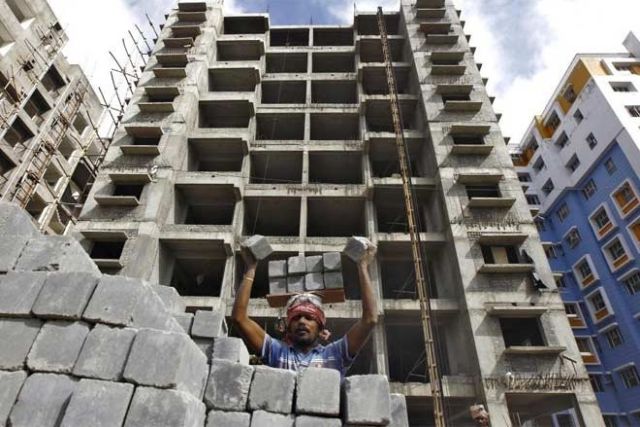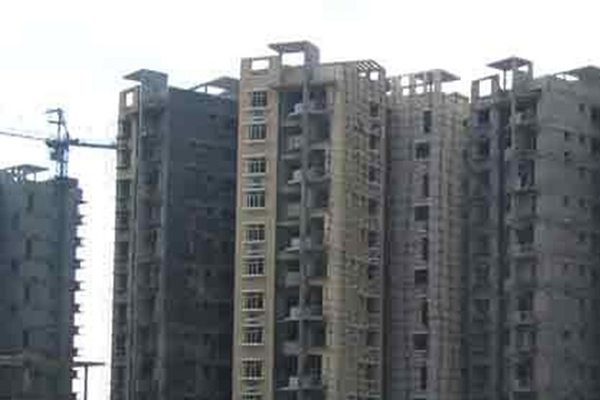
by admin | May 25, 2021 | Economy, Finance, Investing, Markets, News, Property
 By Rituraj Baruah,
By Rituraj Baruah,
New Delhi : The affordable housing segment, which is the new rage in the real estate sector after it got infrastructure status last year, still suffers from lack of funds from banks. Market participants feel they still have to wait a few more months before banks embrace such projects.
Infrastructure status for the segment was announced by Finance Minister Arun Jaitley in his Budget speech for 2017-18 on February 1, 2017, which allowed builders to borrow from banks at cheaper rates compared to the conventional lenders such as private equities.
“That (infrastructure status) means they (developers) should have been able to access a lot of funds at cheaper rates… but that’s not happening. And that’s not happening anywhere,” said Jayashree Kurup, Head of Content and Advisory, at the property consultant website magicbricks.com .
She added: “It has not translated into anything on the ground, except may be a boost in sentiment.”
Most market participants blame it on the credibility crisis brought about in the past few years by the slump and lack of sales and delivery of apartments to end-users.
“Construction finance has not been doing well — essentially because of the fact that the sales have not been good,” Shrikant Srivastava, Chief Risk Officer, India Mortgage Guarantee Corporation, told IANS.
Srivastava, who has also served as the Chief Risk Officer at PNB Housing Finance, further said: “All lenders have burnt their fingers in doing construction finance because projects did not get completed, sales did not happen, and therefore the loans they had taken, they could not pay back.”
In the affordable housing space, bankers want to do projects, but as lenders have suffered losses in the prime segment, bankers were shying away from giving construction finance for the segment, he added.
Ankur Dhawan, Chief Investment Officer, PropTiger.com, said: “Bank funding is a problem for the overall real estate sector and is not limited only to affordable housing. The sector has seen too many NPAs (non-performing assets) which makes banks cautious in funding this sector.”
Aditya Kedia, MD of Mumbai-based Transcon Developers, attributed the lack of interest of banks in the sector to the inexperience of the banks in working with realtors.
“Even for the banking institutions, it is a new field; so the primary concern these people (banks) have is that since these are smaller-sized apartments, people buying them probably are from the lower income bracket,” he said.
Market players, however, feel this lack of trust between the banks and developers would wane in a few months.
Kedia was of the opinion that “it is a learning process for both, the developers as well as the banking sector, and I think it will take six to eight months for it to be understood well”.
J.C. Sharma, Vice Chairman and MD of the Bangalore-based Sobha Ltd, however, contended: “If you (developers) have a good track record in operations, there are no dearth of lenders… even from the banks.”
In view of the recent frauds, mismanagement and rising NPAs, “lending has to happen with far more scrutiny and better processes than what it used to be — and we should welcome it from a systemic benefit point of view,” he opined.
Prasoon Chauhan, CEO of NCR-based Homekraft, said: “Bank, government, everybody is supporting the affordable housing (segment).” So, eventually it should work out.
(Rituraj Baruah can be contacted at rituraj.b@ians.in )
—IANS

by admin | May 25, 2021 | Investing, Opinions, Property
 By Sudhir Pai,
By Sudhir Pai,
Much on expected lines, the government in Budget 2018-19 has continued with its thrust for Affordable Housing and Housing for All scheme. The government has been consistent with its efforts in addressing affordable housing in 2017 — be it giving infrastructure status to this segment in the previous budget, to helping increase the quantum of beneficiaries in CLSS under Pradhan Mantri Awas Yojana (PMAY) by expanding the carpet area and re-defining income definitions. Now, Budget 2018-19 has further given impetus to affordable housing by creating a dedicated fund under the National Housing Bank (NHB).
This fund will be provided for from priority sector lending and fully serviced bonds authorised by the Government of India. Now that the government has created significant enablers to increase demand and to create favourable conditions, we should hopefully see a significant spike in new launches/supply in the coming days in the affordable housing segment.
It is also encouraging to see the government address the issues of housing in urban areas. While providing assistance to construct 37 lakh houses in urban areas will take care of the urban housing woes, financial assistance (Rs.2.04 lakh crore) to 99 Smart Cities will ease the pressure on the existing urban centres.
Further, the Finance Minister also proposed that no adjustment shall be made in respect of transactions in immovable property, where the circle rate value does not exceed 5 per cent of the consideration — this would affect only those localities where circle rates are higher than prevailing market rates. The government steered clear of further tax breaks for either industry or for the buyers.
That said, the government has been actively regulating the real estate industry over the last several quarters. From demonetisation aimed at curbing the effect of unaccounted money; to RERA which will help bring in consumer confidence, the real estate sector has seen significant regulatory influence in the past year.
While the budget is now done and dusted, there are some matters which would help drive the industry ahead more vigorously. We hope that going ahead the government will (a) address the issue of GST on new homes which is currently inflationary (b) examine the issue of lowering the cost of transactions, particularly stamp duty and registration fees (c) create enablers for the sector such as digitisation of property registries; guaranteeing or insuring land/property titles; enhancing liquidity in real estate markets through REITs and other means and (d) strengthen RERA to resolve disputes speedily and help drive confidence amongst consumers.
As we’ve been saying for a while now, there are green shoots emerging in the industry once again and we expect a gradual recovery in the course of 2018. With the government having done its bit, there is now need for concerted and purposeful action from developers and other stakeholders in the industry to do their bits and help the process for a better 2018 for real estate.
(Sudhir Pai is CEO of magicbricks. He can be contacted at sudhir.pai@timesgroup.com)
—IANS

by admin | May 25, 2021 | Business, Large Enterprise
 Mumbai, (IANS) Tata Housing Development Company’s subsidiary Tata Value Homes on Monday announced raising $25 million from British development finance institution CDC to strengthen affordable housing projects in India.
Mumbai, (IANS) Tata Housing Development Company’s subsidiary Tata Value Homes on Monday announced raising $25 million from British development finance institution CDC to strengthen affordable housing projects in India.
“Investment from CDC will help us further our commitment towards delivering quality living spaces to low and middle income groups in the country,” said Tata Housing chief executive Brotin Banerjee in a statement.
The British government-owned CDC was founded in 1948 with the mission to build businesses across Africa and South Asia and to create jobs and make a lasting difference in the lives of people from the poorest places.
“We’ve made this investment because affordable housing in India is highly a developmental sector because it creates a high number of construction jobs per dollar invested, and will increase access to housing for India’s emerging middle class,” said Srini Nagarajan from CDC in the statement.
According to the statement, Tata Value Homes delivered 3,000 homes across various projects in the country last year.
Established in 1984, Tata Housing Development Company Public limited is a subsidiary of Tata Sons Limited.



